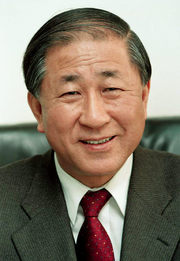 |
That is the setting as Abe goes to Korea and China. Both countries maintained that certain prerequisites had to be met before any summit talks with Japan, but now they are going beyond that and a formal resolution is going to be sought after those meetings take place. Abe’s people, for their part, came to the conclusion that merely having summit meetings in Seoul and Beijing will give them an advantage in the various elections coming up over the next 10 months. There are widespread rumors that he has already secretly promised China that he will not worship at Yasukuni in an official capacity. As for Korea, the dominant view in Japan is that Korea was suddenly isolated when Sino-Japanese relations began moving forward again, making it unable to insist on a strong position of any kind. China is one move ahead of Korea in terms of policy towards Japan. Ahead of Abe’s inauguration, China invited 100 Japanese businessmen with investment holdings there and asked them to pressure Abe to stop praying at Yasukuni. Prior to that, Japanese Democratic Party chairman Ozawa Ichiro was invited to meet with president Hu Jintao, and then show the television cameras what a warm reception the party chairman received. Beijing has been pushing on Abe, who has elections for the upper house of the Diet coming next July. Korea needs to stop letting Yasukuni be the biggest issue in relations with Japan. It needs to make sure it does not get dragged into a compromise Abe may try to achieve by covering up the essence of the issue with vague "separations" of official and personal positions, or by simplistic methods such as the creation of another location to honor war dead. Even if the issue of Yasukuni does actually get resolved, Korea must not lose sight of the bigger problems. Those would be the move to introduce ultra-nationalist content to Japanese education while vaguely avoiding Yasukuni, the attempt to use North Korea as an imaginary excuse to gain "the right of collective self defense," and the attempt to increase military spending and revise the constitution. Korea should not grab the clothing and lose the body. When it began, Roh’s Participatory Government made the mistake of overlooking the past when it came to relations with Japan. In its later stages, it made the mistake of overlooking the future. I want to argue that the core issue from the past is not worshiping at Yasukuni - it is that those three treaties from the final years of precolonial Korea were all invalid. The core concerns for the future are establishing a "Korea-Japan civic order," in which the civil societies of each country are placed at the center, and to firmly establish cooperative economic relations as one strategy for finding the Korean economy a place in Northeast Asia. In response to Abe’s call for a hard-line reaction to a North Korean nuclear test, it might be worth calling for a nuclear-free Northeast Asia, one that keeps North Korea from developing nuclear weapons and links that to a non-nuclear Japan. I really hope the Korean government does not lose its way amid the dense mist that arrives with Abe’s visit to Seoul.





